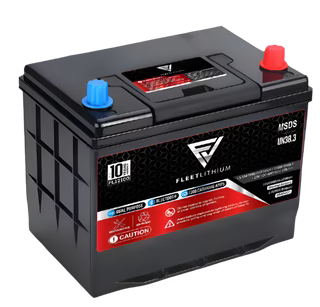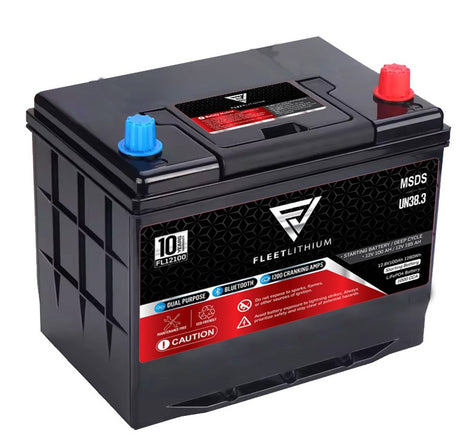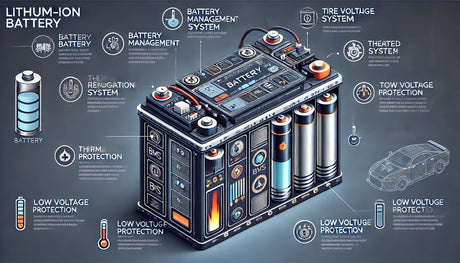Choosing the right battery can be a challenging task, whether you're powering an electric vehicle, solar energy system, RV, or consumer electronics. With so many types of batteries available—each with unique features, benefits, and limitations—it’s essential to understand the factors that affect performance, lifespan, and overall efficiency.
In this guide, we’ll walk you through the key considerations to help you select the right battery for your needs, while also touching on how Fleet Lithium offers optimal solutions for various applications.
1. Understand Your Power Needs
Before you start browsing through different types of batteries, it’s essential to first understand the specific requirements of your application. This will help you narrow down your choices and make a more informed decision.
-
What is the voltage requirement?
Different devices and applications require different voltages. For example, a solar power system typically operates at a higher voltage than a smartphone or laptop. Make sure the battery you choose is capable of meeting these voltage needs. -
What is the required capacity (Amp Hours or Ah)?
The capacity of a battery refers to how much energy it can store and deliver over time. For example, an electric vehicle needs a high-capacity battery to travel long distances, while a small gadget like a camera needs much less. Be sure to select a battery that matches the energy demands of your equipment. -
What is your required runtime?
Consider how long the battery needs to power your device or system. A battery with a higher capacity will typically offer longer runtime, but it may also come at a higher initial cost.
2. Types of Batteries: Pros and Cons
The market offers various types of batteries, each with its advantages and disadvantages depending on the application. Here are some of the most common types:
Lithium-Ion (Li-ion) Batteries
Pros:
- High energy density: Lithium-ion batteries can store more energy in a smaller and lighter package compared to other battery types, which is essential for devices where weight and space are important, like electric vehicles (EVs), solar energy systems, and power tools.
- Long lifespan: These batteries can last anywhere from 5,000 to 7,000 charge cycles, much longer than lead-acid batteries.
- Fast charging: Lithium-ion batteries charge more quickly, which can be a huge advantage for applications like electric vehicles.
- Safer chemistry: LiFePO4 (Lithium Iron Phosphate) batteries, a type of lithium-ion, are more thermally stable and less likely to overheat or catch fire compared to other lithium chemistries, making them a safer choice.
Cons:
- High upfront cost: While lithium-ion batteries are more efficient and longer-lasting, they often come with a higher initial cost.
- Environmental impact: Mining for lithium, cobalt, and nickel can have environmental and ethical concerns.
Fleet Lithium Solution: Fleet Lithium offers LiFePO4 batteries, which are safer, more durable, and long-lasting—perfect for demanding applications like solar energy storage, electric vehicles, and marine use. We also focus on responsible sourcing and environmental sustainability to address concerns related to raw material extraction.
Lead-Acid Batteries
Pros:
- Lower initial cost: Lead-acid batteries are generally cheaper than lithium-ion batteries, making them more affordable upfront.
- Proven technology: Lead-acid batteries have been around for a long time and are widely used in automobiles, backup power systems, and other industrial applications.
Cons:
- Shorter lifespan: Lead-acid batteries typically last between 500 to 1,000 charge cycles, significantly less than lithium-ion batteries.
- Heavier and bulkier: They tend to be much larger and heavier, which makes them less suitable for weight-sensitive applications.
- Maintenance: Lead-acid batteries require regular maintenance, such as checking fluid levels and ensuring they remain fully charged.
Nickel-Metal Hydride (NiMH) Batteries
Pros:
- Environmentally friendly: NiMH batteries do not contain toxic chemicals like cadmium found in nickel-cadmium (NiCd) batteries.
- Good performance: They offer a good balance of performance, energy density, and reliability for consumer electronics and hybrid vehicles.
Cons:
- Lower energy density than lithium-ion: NiMH batteries do not offer the same energy density as lithium-ion batteries, which means they are less compact and efficient for high-performance applications.
3. Battery Life and Cycle Durability
One of the most important factors when choosing a battery is how long it will last, both in terms of overall lifespan and its ability to go through charge cycles without degrading.
- Cycle life: A battery’s cycle life is the number of charge-discharge cycles it can go through before its capacity starts to significantly degrade. For instance, lithium-ion batteries typically have a longer cycle life (up to 5,000 cycles or more) compared to lead-acid batteries (which last around 500 to 1,000 cycles).
- Deep discharge tolerance: Some batteries, like LiFePO4, can be safely discharged to a greater extent without causing harm, whereas other batteries, like lead-acid, may suffer damage if regularly discharged deeply.
Fleet Lithium Solution: Our LiFePO4 batteries offer a long cycle life of 5,000 charge cycles, meaning they can last up to 15 years or more depending on usage, making them an excellent choice for long-term applications like solar energy storage, RV power systems, and electric vehicles.
4. Safety Considerations
When selecting a battery, especially for larger applications like electric vehicles, solar storage, and marine power systems, safety is a major concern. Some types of batteries are more prone to overheating or even catching fire in extreme conditions.
- Lithium-Ion (LiFePO4): Lithium Iron Phosphate (LiFePO4) batteries are among the safest lithium-ion batteries due to their thermal stability, which makes them fire-resistant and less likely to overheat.
- Lead-Acid: While safe when properly maintained, lead-acid batteries can release dangerous gases, especially in poor ventilation conditions.
- Nickel-Based Batteries: NiMH and NiCd batteries are generally safe but can be prone to memory effects (a phenomenon where batteries lose their ability to hold a charge) if not handled properly.
Fleet Lithium Solution: Fleet Lithium’s LiFePO4 batteries come with built-in Battery Management Systems (BMS) that actively monitor temperature, voltage, and current to prevent overcharging and overheating. Our batteries are also equipped with thermal protection, ensuring safety in a wide range of applications.
5. Cost and Long-Term Investment
While initial cost is important, you should also consider the total cost of ownership. A cheaper battery upfront may not always be the best choice in the long run due to shorter lifespan, higher maintenance, and the frequency of replacements.
- Lithium-ion batteries might cost more initially, but their longer lifespan and higher energy density make them a better investment for the long term, reducing the need for frequent replacements.
- Lead-acid batteries, while less expensive upfront, require frequent replacement and maintenance, adding up over time.
Conclusion: How Fleet Lithium Helps You Choose the Right Battery
When selecting the right battery, it’s essential to consider your power needs, application, budget, and safety requirements. While lithium-ion batteries generally offer superior performance, long lifespan, and higher energy density, there are instances where lead-acid or NiMH batteries may be a more cost-effective solution for short-term or low-power needs.
At Fleet Lithium, we offer high-performance, long-lasting lithium-ion batteries that are ideal for a wide range of applications, including solar storage, electric vehicles, marine, and RV power systems. Our LiFePO4 technology ensures maximum safety, environmental sustainability, and reliable performance, making us a trusted choice for powering your future.
By understanding your needs and considering the pros and cons of each battery type, you can make an informed decision that will power your systems reliably for years to come.
Fleet Lithium – Powering the Future, Safely and Efficiently.


















